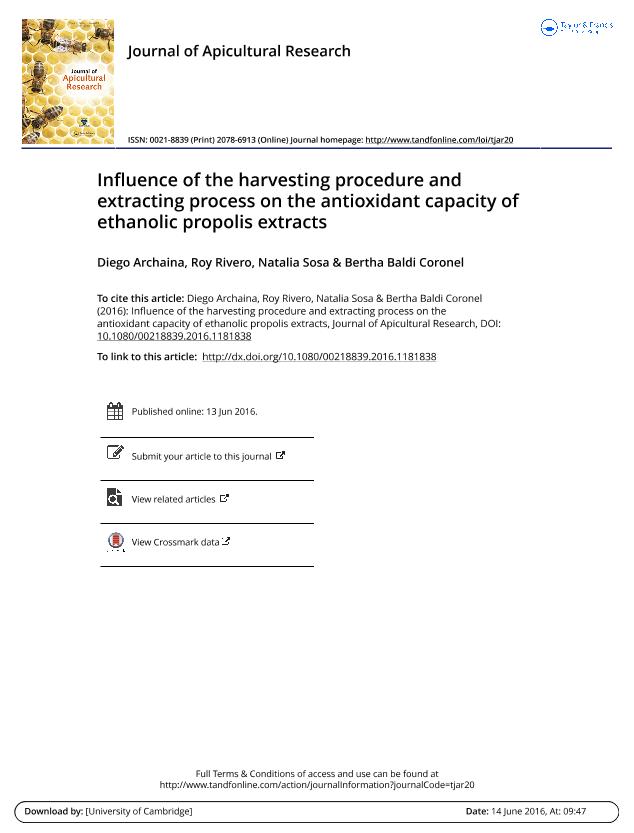Artículo
Under article 1339 of the Argentine Food Code, food containing propolis is considered dietary. Propolis is a complex mixture of over 200 compounds, mainly polyphenols, which are classified as bioactive, and have important biological effects. Its composition depends on the origin of the sample, and therefore the relationship between flavonoids and biological effects is of interest to assess those constituents. Propolis may be suitable for use in the formulation of functional foods or potentiate the biological effects of other food constituents, combining and acting together. Propolis samples were obtained by scraping and trapping. Extractions were also carried out with dissolutions in 70, 80, and 85% ethanol at room temperature, by mixing and stirring; and by the Soxhlet method. The concentration of the resulting extracts was achieved at 30 and 40 °C. In all cases the antioxidant capacity was measured by the Trolox method, the efficiency of the extraction and the concentration of the total flavonoids and phenols were calculated. We found that the temperature which is used to concentrate them has influence on their antioxidant power, the latter being lower at lower temperature. Soxhlet extraction decreases antioxidant capacity as well as content of flavonoids and phenolic compounds. The resulting extracts showed good antioxidant capacity and didn’t show direct relationship with ethanol concentration. En virtud del artículo 1339 del Código Alimentario Argentino, los alimentos que contienen propóleo se consideran dietéticos. El propóleos es una mezcla compleja de más de 200 compuestos, principalmente polifenoles, los cuales están clasificados como bioactivos, y tienen importantes efectos biológicos. Su composición depende del origen de la muestra, y por lo tanto la relación entre los flavonoides y los efectos biológicos es de interés para evaluar a sus constituyentes. El propóleos puede ser adecuado para su uso en la formulación de alimentos funcionales o potenciar los efectos biológicos de otros componentes de los alimentos, combinándolos y actuando juntos. Se obtuvieron muestras de propóleos por raspado y recogida. Las extracciones también se llevaron a cabo con disoluciones en 70, 80, etanol 85% a temperatura ambiente, mezclando y agitando; y por el método de Soxhlet. La concentración de los extractos resultantes se logró a 30 °C y 40 °C. En todos los casos la capacidad antioxidante se midió por el método de Trolox, se calculó la eficiencia de la extracción y la concentración de los flavonoides totales y fenoles. Se encontró que la temperatura que se utiliza para concentrarlos tiene influencia en su poder antioxidante, siendo este último inferior a la temperatura más baja. La extracción Soxhlet disminuye la capacidad antioxidante así como el contenido de flavonoides y compuestos fenólicos. Los extractos resultantes mostraron una buena capacidad antioxidante y ninguna relación directa con la concentración de etanol.
Influence of the harvesting procedure and extracting process on the antioxidant capacity of ethanolic propolis extracts
Título:
Influencia del procedimiento de recolección y del proceso de extracción en la capacidad antioxidante de los extractos etanólicos de propóleos
Fecha de publicación:
10/2015
Editorial:
International Bee Research Association
Revista:
Journal Of Apicultural Research
ISSN:
0021-8839
Idioma:
Inglés
Tipo de recurso:
Artículo publicado
Clasificación temática:
Resumen
Palabras clave:
Antioxidant Capacity
,
Flavonoids
,
Propolis Extract
,
Trolox
Archivos asociados
Licencia
Identificadores
Colecciones
Articulos(SEDE CENTRAL)
Articulos de SEDE CENTRAL
Articulos de SEDE CENTRAL
Citación
Archaina, Diego Alberto; Rivero, Roy Cristian; Sosa, Natalia; Baldi Coronel, Bertha Mabel; Influence of the harvesting procedure and extracting process on the antioxidant capacity of ethanolic propolis extracts; International Bee Research Association; Journal Of Apicultural Research; 54; 5; 10-2015; 474-481
Compartir
Altmétricas




